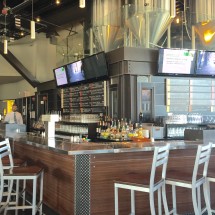Law Offices of John P. Connell, P.C.: Applicants for brewery licenses and existing breweries in Massachusetts have come to see so-called “tap rooms” as a valuable source of potential or actual income for their business, and a great way to promote the brewery and the brand. However, both applicants and existing breweries should be aware of the licensing structure that distinguishes from a “brewpub” from a brewery with a “tap room,” and what a brewery can and cannot do in its “tap room.”
One issue cropping up more and more is where breweries not licensed as “brewpubs” wish to pour beer directly from their finishing vessels on the brewery side of the premises directly through tap lines to taps located at the bar on the “tap room” side of the premises, a prohibited practice under federal law.
First and foremost, “brewpubs” and breweries that have “tap rooms” are totally different regulatory creatures. Licensing for a “brewpub” pursuant to 27 CFR 25.25 requires a TTB Brewer’s Permit wherein “Brewpub” is checked off in Form 5130.10 of the Brewery Application as the type of permit being issued. With regard to this “brewpub” type of permit, the information regarding the pouring section of the premises – known as a “tavern” – must be detailed, as it is technically a variance from the normal brewery approval, and tax determination tanks, usually “brite” tanks, measure taxes on production whenever beer is added to these tanks.
Significantly, pursuant to 27 CFR 25.25(c)(3), once the tax has been measured on beer added to the “tax determination tank,” that beer may be stored on the premises and sold to the public located in the “tavern” area of the premises. Breweries – such as those having or applying for a “farmer brewer’s” license in Massachusetts – which are not qualified as “brewpubs,” are prohibited from storing tax determined beer on their brewery premises. Taxation for beer produced by a “brewer” is measured when the beer produced from the brewery portion of the premise is removed from that premises in “packages” (i.e. kegs or bottles) for sale off the premises pursuant to 27 CFR 25.159.
Accordingly, and according to the TTB, there is no existing protocol around these statutory provisions that would allow a “brewer” not licensed as a “brewpub” from allowing tap lines directly from its pre-tax finishing tanks, which are contained on the “brewery” side of the premises, directly to taps located in the off-premises “tap rooms.” Instead, a “brewer” desiring to operate a “tap room” within the same building as the “brewery” is obligated to finish its beer production on the “brewery” side of the premises; reduce that beer to kegs or other containers; remove those containers from the “brewery” side of the premises and therefore determine taxation; and then finally allow that beer to be poured from taps drawn from the kegs on the “tasting room” side of the building.
While drafting from kegs is certainly more time consuming and less efficient than drafting from “brite” tanks, the TTB will not authorize an application for a “brewer’s permit” if the diagram of the proposed premises indicates the taps located in the “tap room” are drawn from finishing tanks located on the “brewery” side of the premises. Moreover, if such a practice is actually conducted, an audit by the TTB or IRS could yield potential issues for a brewery pouring beer directly from pre-taxed determined beer.
While it may seem simply acquiring “brewpub” status at the TTB level would resolve this issue for a brewery intending on having a “tap room” that will be a significant component of its intended project, acquiring “brewpub” status at the TTB level will require the applicant to apply for a “brewpub” license in Massachusetts pursuant to Chapter 138, Sec. 19D, not a “farmer brewer’s” license pursuant to G.L. c. 138, Sec. 19C.
This is significant in that Massachusetts “brewpub” licenses – by themselves – do not authorize the sale of beer on the premises but require the licensee apply for a “pouring license” issued by the local municipality pursuant to G.L. c. 138, Sec. 12, and those “pouring licenses” can be difficult or expensive to obtain in some cities or towns wherein the number of authorized “pouring licenses” has been exhausted. Indeed, in cities like Boston and Cambridge, such licenses can cost $400,000.00 on the private market. On the plus side, however, “brewpubs,” once they do acquire the Section 12 “poring license” and can sell alcoholic beverages it purchases from wholesalers in addition to its own brands. A “brewpub” is, therefore, essentially a restaurant wherein brewing is allowed on the premises, a significant deviation from the three-tier system’s prohibition against manufactures having an interest in the retail outlet for its own products.
On the other hand, “breweries” in Massachusetts intending on having a “tap room” adjacent to its “brewery” operations, which will not be pursuing “brewpub” status at the federal or state level, are required to obtain from the city or town wherein the brewery is located to obtain a “farmer pouring” license pursuant to G.L. c. 138, Sec. 19G(n), which allows the “farmer brewer” to pour its beer on premises. “Breweries” can also self-distribute its own products to retailers, such as liquor stores and restaurants, while “brewpubs” cannot self-distribute, and must use a Massachusetts wholesaler to distribute its own products.
Many of the same requirements of the “pouring license” authorized pursuant to Section 12 are applicable to the “farmer pouring” license,” but importantly such “farmer pouring licenses” are not subject to the quota limit for Section 12 “pouring licenses” as set forth in G.L. c. 138, Sec. 17, and therefore are readily available.
Knowing what type of on-premises “tavern” or “tap room” a brewer wants to establish from the get-go will insure a smooth licensing application at both the federal and state levels.
Submitted by John P. Connell, Esq. © 2015

